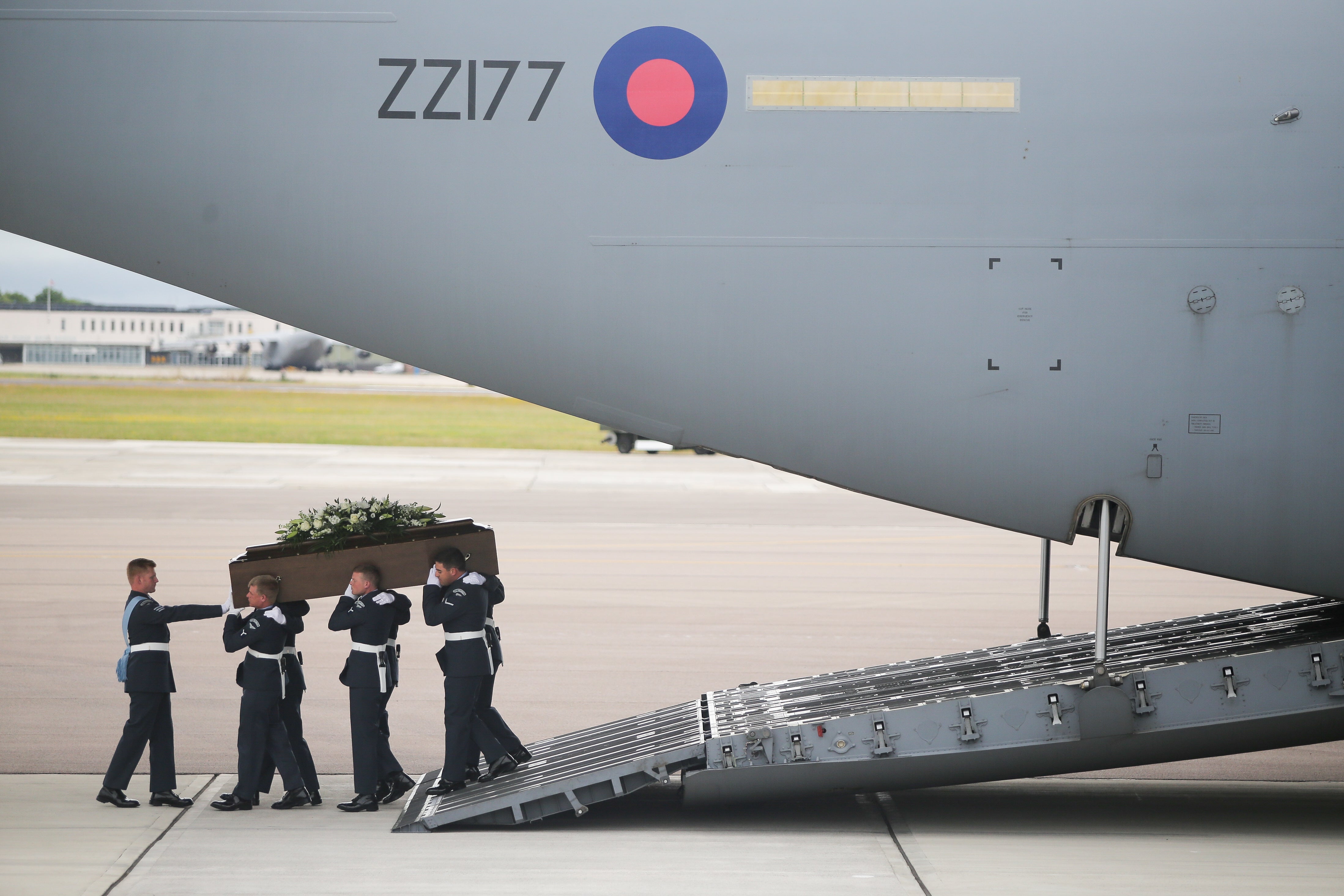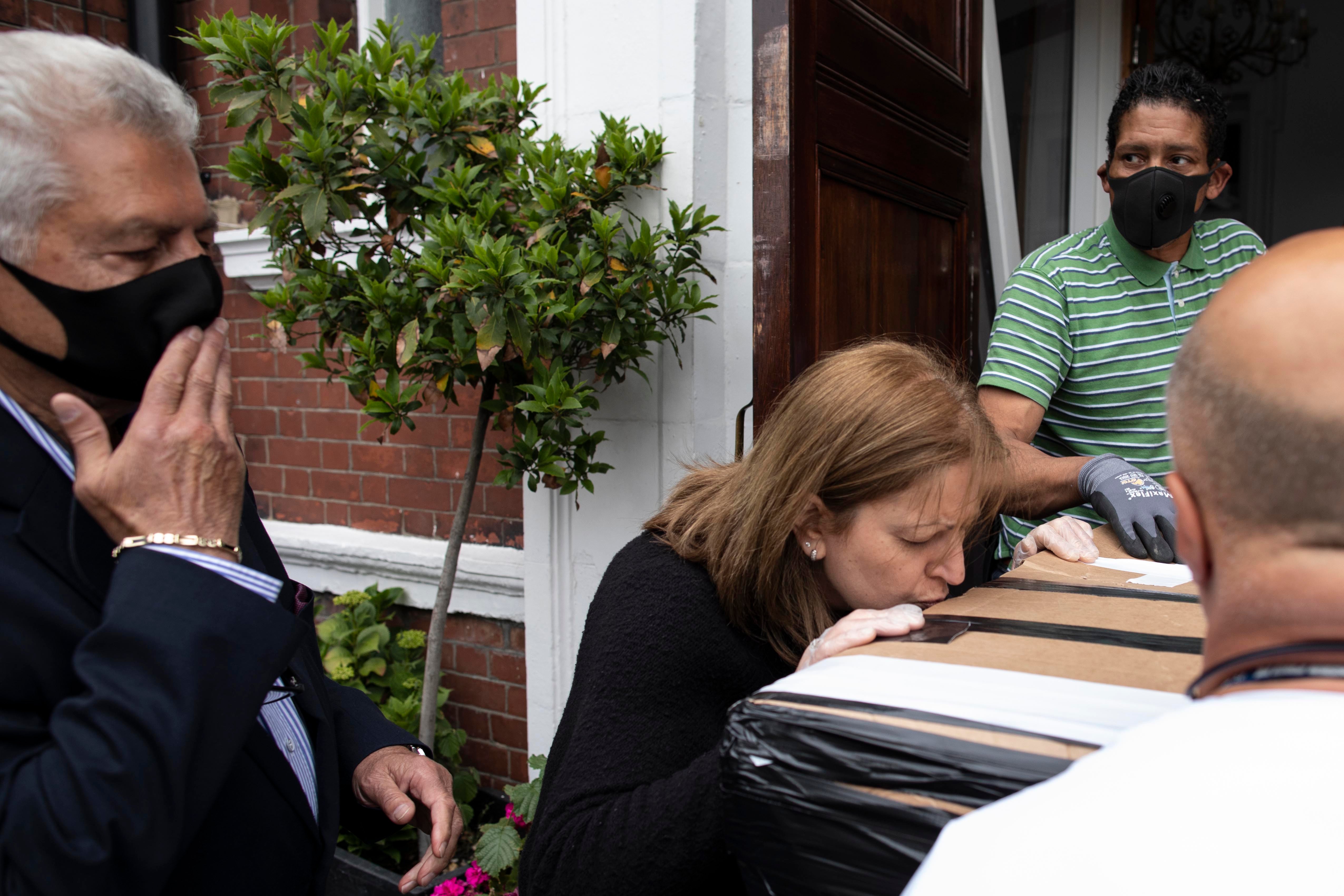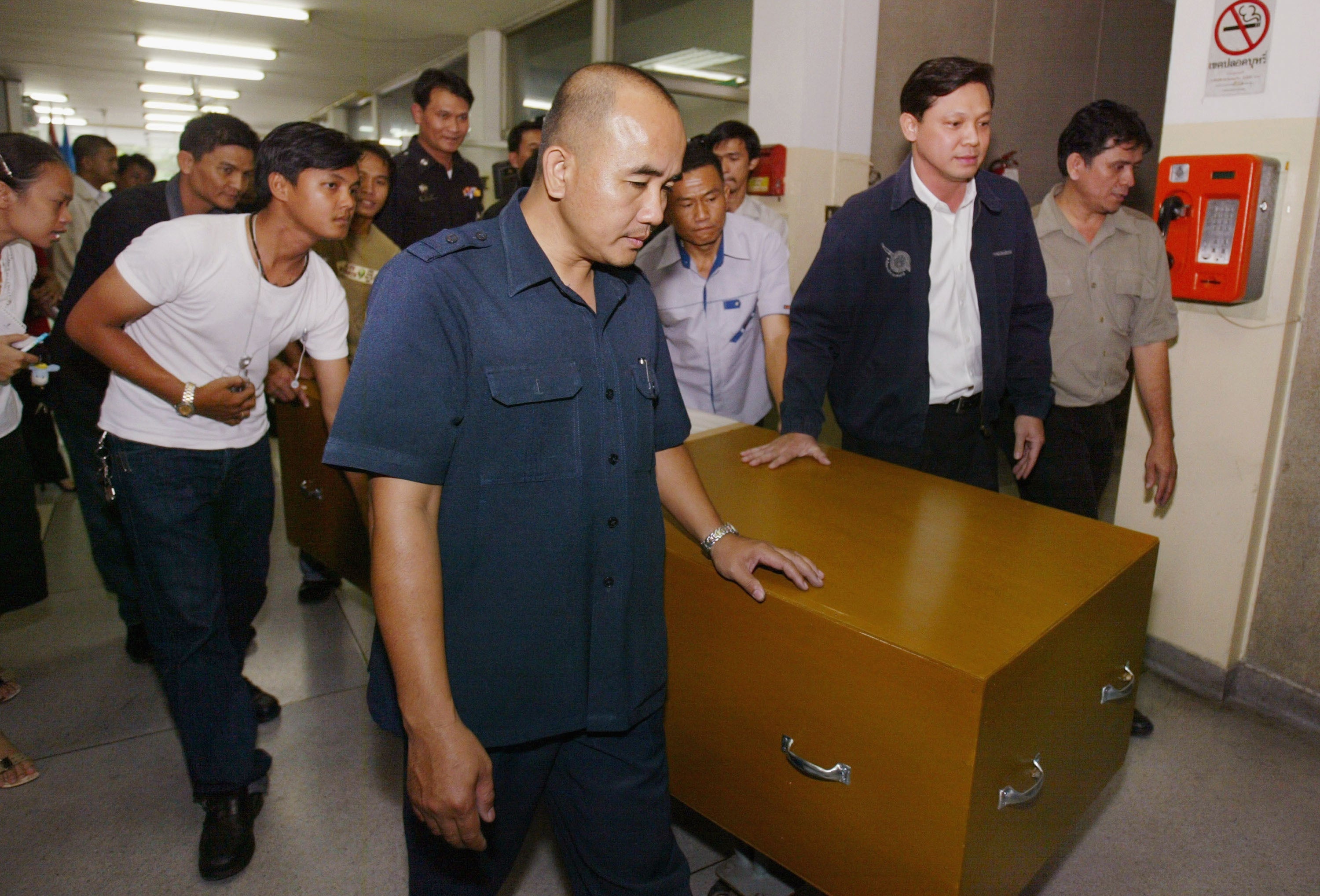A death abroad: The grim business of bringing home the dead
Thousands of people die abroad every year, from maladies, misadventure and murder. Len Williams explores the trying bureaucracy of everyone’s worst travel nightmare

I spent eight hours hitting refresh on the shitty in-flight wifi to find out if my partner was still alive or not,” recalls Anna. In late 2019, the British expat was flying from the UK to the Middle Eastern country she’d moved to a few years earlier. “He died while I was on the plane.” It was, she says, “the worst flight ever”.
Anna’s partner Michael (not their real names) had been rushed to hospital the night before complaining of chest pains. Anna was on a trip to London when she received a panicked phone call from a friend that he was having a heart attack, so she got on the first flight home. “I wish I could’ve been there, but I couldn’t have saved him.” After touching down, the next 24 hours was a numbing procession of paperwork, setting up the spare room for his sisters who were arriving later that day and figuring out what she had to do next.
The death of a loved one abroad is surely everyone’s worst travel nightmare. Not only is there the shock and grief of hearing a child, partner or parent has died, but their body is hundreds or even thousands of miles away. You are almost immediately thrown into a Byzantine world of paperwork, its complexity magnified by cultural and language differences. Where does one file a death? Is an inquest needed? How do you get a body home? Where do you source travel coffins?
Around 3,000 British people died abroad last year according to the FCO. This figure was somewhat lower than the average for previous years (which sits at around 4,000), likely because of coronavirus travel restrictions. Nevertheless, the statistics make for grim reading.
Most deaths are put down to natural causes, and often happen in hospital. Still, there were at least 80 accidental deaths, 31 drownings, 33 murders and 82 suicides. There were also 800 cases where the cause of death is “unknown” (where there are fewer than five deaths for each category, the FCO doesn’t give a precise figure, so the actual numbers may be a little higher).
Most British deaths abroad happen in Spain (647 last year) followed by Thailand, where 457 passed away. South Africa topped the murder list with seven killings, Greece was worst for drowning and Australia saw the highest proportion of suicides (17 out of 47 deaths).
For most people, death abroad doesn’t bear thinking about. But what if it does happen? What do you do?
Gary Hart is a manager at Mears Repatriation, a funeral directors in Kent. The firm caters to both “inbound” repatriation (getting bodies back to the UK) and “outbound”, for foreign nationals who die here.
In theory, the process is relatively straightforward Hart says. First, the death has to be registered at a consulate. If the customer uses Mears’ services, the company then makes use of its contacts with funeral directors around the world. “We’ll put the family in touch with our local agent and the deceased is brought into their care.” There’s then paperwork to fill out and the corpse must be embalmed.

The body then needs to be placed in a repatriation coffin. In the majority of cases this is zinc-lined and hermetically sealed. Zinc is used because X-ray machines can “see” through the metal to inspect what’s inside. It’s a morbid thought, but the coffin is then loaded onto a regular aeroplane’s hold in among other travellers’ suitcases. Even corpses need a passport to travel – their travel documents and death certificate are put in the care of the pilot who ensures its safe delivery.
The process is often fairly smooth. However, the experience can still feel very overwhelming and there are all kinds of obstacles and bumps on the way. In Anna’s case, insurance for repatriation was provided by her partner’s employer, but she found they’d chosen a low quality offering. “Even trying to call up his insurance company was difficult and they were completely useless … so I gave up with that and decided to do it myself.”
However, “I soon realised there were many issues I hadn’t foreseen.” She engaged a funeral company who helped with a lot of the practical side of things. They provided the correct kind of coffin for Michael’s body, booked a flight and organised the embalming. Nonetheless, there were plenty of things she had to do herself.

She and Michael were not married, so in the Muslim country they lived in, it was technically illegal for them to be living together. His sisters therefore needed to fill in much of the official paperwork, despite speaking no Arabic or having any knowledge of the country. They did the rounds of government offices, speaking to police officers and officials, getting his visa cancelled, translating records, getting his company to fill in various forms. “Some government services here are very advanced” technologically, she says, “but the machinery of government that deals with dead expats still relies on handwritten forms and rubber stamps.”
There were several trying experiences over the course of the week. “When we went to the hospital to pay the bill and receive his final effects it all suddenly became horribly real,” she remembers. There was a darkly comic moment where she had to identify Michael’s body at a police morgue and heard the handlers almost drop his corpse in the next room.
Anna fortunately speaks Arabic, yet she wonders how people who don’t understand the language would cope with the system. There were cultural differences too. “They have a much more blunt attitude to death here,” she says. “Other than the person at the hospital’s billing department, no one showed any sympathy towards us.”
Repatriation is an expensive business. In Anna’s case, the entire process cost some $13,000 (£9,500) including the coffin, flights and funeral director’s fees. But it can cost even more, especially from destinations further afield.
I spent eight hours hitting refresh on the shitty in-flight wifi to find out if my partner was still alive or not ... He died while I was on the plane
Colin Bell runs the Kevin Bell Repatriation Trust, a charity that helps bring bodies of the deceased back to the island of Ireland (the Republic and Northern Ireland, but not Britain). He explains that costs change depending on location. Transporting a body from Europe will cost in the range of €5,000 (£4,300) to €7,000. A body from the US could cost $10,000-15,000 while Australian repatriation costs can be up to A$15,000 (£8,400). China and the Far East are usually the most expensive.
Bell set the trust up after his son Kevin was killed in a hit and run in New York City in 2013. “When the news broke that Kevin had been killed, our entire town [Newry, County Down] went into a frenzy of fundraising.” The family soon raised more than enough money to get Kevin’s body home, so Bell launched the trust to help other families facing similar tragedies. In the seven years since, the charity has helped bring over 1,000 bodies home.
“If somebody dies far away you don’t know where to go or who to talk to,” Bell says. “You’re so far away and no one knows how to arrange or finance” the repatriation. The trust takes this out of their hands. Bell says they mainly serve families of younger people who have died in tragic circumstances.
“Governments just don’t pay for it,” reports Bell. Without charities like his, families who cannot afford the steep cost of repatriation must either take on large debts, or decide to have a child, partner or parent buried or cremated in foreign lands.
“It’s like a club no one wanted to join.” That is how Kim Spooner describes Murdered Abroad, the charity, campaign and support group she is a trustee of.
If collecting the body of someone who died of natural causes sounds hard enough, dealing with murder victims is even more traumatic. Murders involve the police and bodies being kept in storage for evidence and inquests. Besides liaising with authorities who may speak a different language and have very different ways of working, there are disorienting visits to court too.

Murdered Abroad was set up in 2001 by families who’d gone through this experience themselves. “They realised there’s no help and assistance,” says Spooner, and so grouped together to provide peer support. The trust also does lobbying work and has 200 members who attend quarterly meetings. “It gives an opportunity for our members to discuss their cases and receive solace and support,” says Spooner. Having a loved one murdered abroad is “such an unusual and rare experience, but [attending meetings] helps them realise they’re not alone”.
One thing the trust does is provide advice to victims’ families – which may be different to what the embassy in the country might tell them. “Sometimes the consulate in the country might advise the family not to repatriate the body,” she explains. The idea being that a local cremation or burial is often less expensive. However, Spooner suggests families should think twice. “If the body of a murder victim is returned to [the UK], there must be an inquest,” she says. This could help provide crucial evidence, and means that there might be a route forward for further investigation, especially if the local investigators don’t do a satisfactory job.
That being said, “most of our members have generally good experiences with foreign police”, and “they respect the fact that this is a foreign family who are shocked and feeling lost”.

In fact, it is often UK-based agencies that cause more friction. Spooner says that the foreign office, the coroner’s office and British police tend to see it as “the other country’s problem”.
The trust has launched a number of campaigns to bring issues facing murder victims’ families to light. One is the issue of terror victims. The UK government does have a policy of bringing home the bodies of people who’ve been killed in terrorist acts. Yet this can be surprisingly hard to prove, especially if the victim was the only person killed (as opposed to dying in a mass attack). That means the families of individuals who are killed by terrorists may still not receive government help.
Perhaps one of the hardest things about dealing with a murder abroad – or any death for that matter – is that “the bereavement process can be very much delayed,” Spooner says. Many families throw themselves into seeking justice and get taken up in the process, so it may be months or years before they start to deal with the death itself. “You come to a point where you’re no longer driven by the legal process and only then do you have time to really grieve.”
An FCO spokesperson explained the agency’s approach to British deaths abroad: “The death of a loved one is a hugely distressing experience. Our staff are contactable 24 hours a day, and can provide people faced with death abroad with support tailored to their situation.
“This could include offering advice on local laws and requirements, supplying details of emotional support services, and putting people in touch with organisations that are able to make practical arrangements such as repatriation.”
While death abroad is a complex and bureaucratic process, Gary Hart of Mears Repatriation says most bodies normally get home within 20 working days, and many take less than that. However, the Covid-19 pandemic has “really ground things to a halt” and it is very difficult to get flights in and out of the UK.
If nothing else, these challenges and costs highlight the importance of travel insurance. But Hart warns that “it’s important to check that the policy has adequate repatriation cover because we’ve often seen occasions where it is not sufficient to cover the costs”.
Almost a year and a half since her partner’s death, Anna still lives abroad and attends a support group for other expats who’ve lost loved ones. While most of the paperwork is finished, there are still occasional bureaucratic issues to deal with: ID cards that need to be cancelled, bank accounts to be closed, a car she can’t sell because the paperwork isn’t in her name. But she also has time to remember the “intellectual, fun and lovely man” he was.
“The thing is people think [repatriation] just sort of happens automatically,” she says. But, in fact, “there are so many hoops to jump through ... You’ve got to be ready for that.”

Join our commenting forum
Join thought-provoking conversations, follow other Independent readers and see their replies
Comments